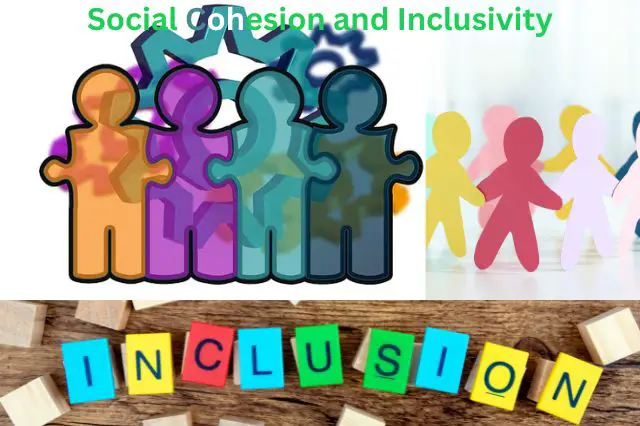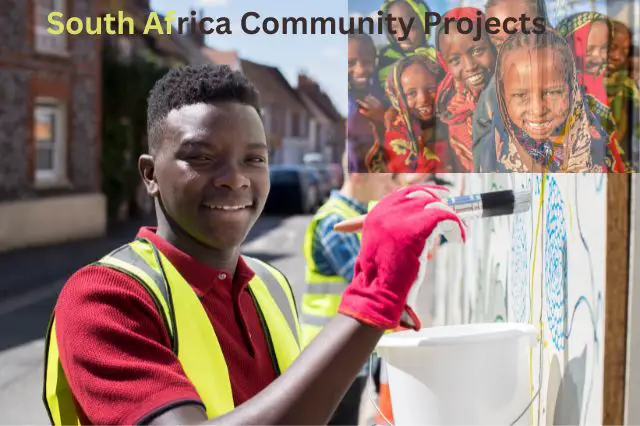We have successfully put together an article to discuss the two positive aspects of change in South Africa. This has to do with embracing transformation.

According to Nowak, Michael [5], South Africa has undergone significant social, political, and economic changes since the end of apartheid in 1994. The transition to democracy has brought about numerous challenges, but it has also resulted in many positive developments. This article will identify and critically explain two positive aspects of change that have emerged in the country, showcasing what are the positive effects of change in the nation. The two main aspects covered in this article are economic growth and development, as well as social cohesion and inclusivity.
Positive Aspect 1: Economic Growth and Development
1. Growth of South Africa’s Economy:
One of the two positive aspects of change in South Africa is the growth of the country’s economy since the end of apartheid (Mbeki, Thabo) [4]. This growth has been spurred by increased foreign investment and trade, which are two positive effects of globalization. According to an overview by the World Bank [12], South Africa’s inclusion in the global economy has provided access to new markets, technology, and resources that have fueled economic growth.

Foreign Investment and Trade:
Since the end of apartheid, South Africa has attracted significant foreign investment. The country’s abundant natural resources, well-developed financial sector, and improving infrastructure make it an attractive destination for foreign investors. Investments have come from various sources, including multinational corporations, international development agencies, and private individuals.
Key points:
- Increased foreign investment since the end of apartheid
- South Africa’s attractive investment features: natural resources, financial sector, and infrastructure
- Various sources of investment: corporations, development agencies, and individuals
Trade has also played a crucial role in the growth of South Africa’s economy. The country has established strong trade relationships with countries such as China, the United States, and the European Union. Exports have diversified, including not only raw materials and commodities but also manufactured goods and services.
Key points:
- Strong trade relationships with major global players
- Diversified exports: raw materials, commodities, manufactured goods, and services
Infrastructure Improvements
The improvements in infrastructure, such as transportation networks, housing, and public utilities, have contributed to the country’s development (DBSA, 2020) [10]. Significant investments have been made in road, rail, and port infrastructure, facilitating the movement of goods and people across the country and internationally. The construction of new housing developments and the upgrading of informal settlements have also helped to improve living conditions for many South Africans.
Key points:
- Investments in road, rail, and port infrastructure
- Construction of new housing developments and upgrading of informal settlements
2. Opportunities for Job Creation and Entrepreneurship
Economic growth has created opportunities for job creation and entrepreneurship, which are examples of positive aspects of change. As the economy grows, new businesses emerge, providing employment for the local population and contributing to the overall prosperity of the country.

Job Creation:
South Africa’s growing economy has generated a demand for skilled labor in various sectors, including manufacturing, mining, agriculture, and services (Ebert, Friedrich) [3]. This demand has led to the creation of new jobs and a decrease in the country’s unemployment rate. Although the unemployment rate remains high, particularly among youths, efforts to boost job creation through investment, skills development, and entrepreneurship are ongoing.
Key points:
- Demand for skilled labor in various sectors
- Decrease in unemployment rate, but still high among the youth
- Ongoing efforts to boost job creation through investment, skills development, and entrepreneurship
Entrepreneurship:
The growth of the South African economy has also created opportunities for entrepreneurs to start and grow their businesses. Small and medium-sized enterprises (SMEs) play a vital role in job creation and economic growth in the country. The government has introduced several initiatives to support entrepreneurship [8], such as access to finance, business development services, and mentorship programs.
Key points:
- Opportunities for entrepreneurs to start and grow businesses
- SMEs play a crucial role in job creation and economic growth
- Government initiatives to support entrepreneurship: finance, business development services, and mentorship
Positive Aspect 2: Social Cohesion and Inclusivity
1. Progress Made in Fostering Social Cohesion
Another positive aspect of change in South Africa is the progress made in fostering social cohesion and inclusivity. The establishment of the Truth and Reconciliation Commission and the adoption of the Constitution of South Africa have laid the foundation for a more united and inclusive society.

Truth and Reconciliation Commission:
The Truth and Reconciliation Commission (TRC) was established in 1995 to address human rights abuses committed during the apartheid era (Burrier, 1995) [2]. Its mandate was to promote national unity and reconciliation by providing a platform for victims and perpetrators to share their stories and experiences. By uncovering the truth about the past and providing reparations to victims, the TRC played a crucial role in healing the wounds of apartheid and fostering social cohesion.
Key points:
- Establishment of the TRC in 1995
- Mandate to promote national unity and reconciliation
- Crucial role in healing the wounds of apartheid and fostering social cohesion
Constitution of South Africa:
The adoption of the Constitution of South Africa in 1996 marked another significant step towards social cohesion and inclusivity (A History of the South African Constitution 1910-1996) [1]. The Constitution enshrines the principles of democracy, human rights, and the rule of law. It also provides for the establishment of various institutions to safeguard these principles, such as the Constitutional Court, the Human Rights Commission, and the Public Protector.
Key points:
- Adoption of the Constitution in 1996
- Enshrines principles of democracy, human rights, and the rule of law
- Establishment of institutions to safeguard these principles
2. Promoting Diversity and Tolerance
Embracing diversity and tolerance has been key to effecting positive change in a society that was once deeply divided along racial lines. The promotion of these values has led to an increased sense of unity and understanding among South Africans.
Educational Reforms:
One of the critical areas where diversity and tolerance have been promoted is through educational reforms. The government has implemented policies aimed at integrating schools and promoting equal access to quality education for all South Africans, regardless of their race, ethnicity, or socioeconomic background [11]. Curricula have also been revised to include the history and contributions of various cultural groups, fostering understanding and respect for diversity.

Key points:
- Government policies aimed at integrating schools and promoting equal access to education
- Revised curricula to include the history and contributions of various cultural groups
Cultural Events and Celebrations:
South Africa has a rich cultural heritage, and celebrating this diversity has become an essential aspect of promoting social cohesion (SAHRC) [7]. Events such as Heritage Day, Freedom Day, and Reconciliation Day provide opportunities for South Africans to come together and celebrate their shared history and cultural identity. These celebrations help to foster a sense of belonging and unity among the country’s diverse population.

Key points:
- Cultural events and celebrations: Heritage Day, Freedom Day, Reconciliation Day
- Fostering a sense of belonging and unity among diverse populations
3. Specific Initiatives
Several initiatives have been launched to promote social cohesion and inclusivity [9]. These include community projects, educational programs, and cultural events, all of which demonstrate the positive aspects of change.

Community Projects:
Community projects aimed at promoting social cohesion often focus on bringing people from different backgrounds together to work towards a common goal. Examples include neighborhood clean-up campaigns, community gardens, and sports programs that promote teamwork and cooperation among participants.
Key points:
- Community projects that promote social cohesion
- Examples: neighborhood clean-up campaigns, community gardens, sports programs
Educational Programs
Educational programs that promote social cohesion and inclusivity often focus on teaching tolerance, conflict resolution, and communication skills. These programs may be offered in schools, community centers, or other public spaces, providing individuals with the tools and resources they need to engage in constructive dialogue and build relationships with people from diverse backgrounds.
Key points:
- Educational programs focused on tolerance, conflict resolution, and communication skills
- Offered in schools, community centers, or other public spaces
Negative Aspects of Change
While this article focuses on the two positive aspects of change in South Africa, it is essential to acknowledge that there are also two negative aspects of change. One of the main challenges the country faces is the high levels of crime and violence [12], which hinder social cohesion and economic growth. Additionally, issues like corruption and poor governance [13] have limited the effectiveness of some policies and initiatives designed to address the country’s problems [Reference].
Key points:
- High levels of crime and violence
- Corruption and poor governance
Conclusion
This article has identified and critically explained two positive aspects of change in South Africa, focusing on economic growth and social cohesion. While acknowledging that there are negative aspects of change and more work to be done, it is essential to appreciate and support the positive effects of change that have emerged. By doing so, we can strive to create a more equitable and just society that embraces diversity and fosters unity among its people.
South Africa’s journey towards a more prosperous and inclusive nation is far from complete, but the progress made thus far serves as a testament to the resilience and determination of its people. As the country continues to confront the challenges that lie ahead, it is crucial to celebrate the positive aspects of change and the strides made towards building a brighter future for all South Africans.
References:
[1] “A History of the South African Constitution 1910-1996.” Org.Za, https://www.sahistory.org.za/article/history-south-african-constitution-1910-1996. Accessed 23 Mar. 2023.
[2] Burrier, Edward A. “Truth Commission: South Africa.” United States Institute of Peace, https://www.usip.org/publications/1995/12/truth-commission-south-africa. Accessed 23 Mar. 2023.
[3] Ebert, Friedrich. “Economic Policy in Labor Surplus Economies -Strategies for Growth and Job Creation in Southern Africa.” Fes.de, https://library.fes.de/pdf-files/bueros/ny/00930.pdf. Accessed 23 Mar. 2023.
[4] Mbeki, Thabo. “South Africa’s Key Economic Policies Changes (1994 – 2013).” Org.Za, https://www.sahistory.org.za/article/south-africas-key-economic-policies-changes-1994-2013. Accessed 23 Mar. 2023.
[5] Nowak, Michael. “The First Ten Years after Apartheid: An Overview of the South African Economy.” Imf.org, https://www.elibrary.imf.org/downloadpdf/book/9781589064706/ch001.pdf. Accessed 23 Mar. 2023.
[6] “Overview.” World Bank, https://www.worldbank.org/en/country/southafrica/overview. Accessed 23 Mar. 2023.
[7] SAHRC. “All Have the Right to Celebrate Their Heritage – SAHRC.” Org.Za, The South African Human Rights Commission, 26 Nov. 2015, https://www.sahrc.org.za/index.php/sahrc-media/news-2/item/332-all-have-the-right-to-celebrate-their-heritage-sahrc.
[8] “Small Business Development.” Gov.Za, https://www.gov.za/about-government/small-business-development. Accessed 23 Mar. 2023.
[9] “Social Cohesion.” Uct.Ac.Za, http://www.povertyandinequality.uct.ac.za/social-cohesion-0. Accessed 23 Mar. 2023.
[10] “The Widespread Economic Benefits of Infrastructure Development.” Development Bank of Southern Africa, RW-Admin, 23 Mar. 2020, https://www.dbsa.org/article/widespread-economic-benefits-infrastructure-development.
[11] Gov.Za, https://www.education.gov.za/LinkClick.aspx?fileticket=sKsxhYorWOk%3D&. Accessed 23 Mar. 2023.
[12] Worldbank.org, https://documents1.worldbank.org/curated/pt/438921549055415403/134272-REVISED-DIGITAL-Republic-of-South-Africa-Systematic-Country-Diagnostic.pdf. Accessed 23 Mar. 2023.
[13] Researchgate.net, https://www.researchgate.net/publication/243464082_Corruption_-_The_challenge_to_good_governance_A_South_African_perspective. Accessed 23 Mar. 2023.
Don’t miss out on current updates, kindly like us on Facebook & follow us on Follow @Eafinder OR leave a comment below for further inquiries.






